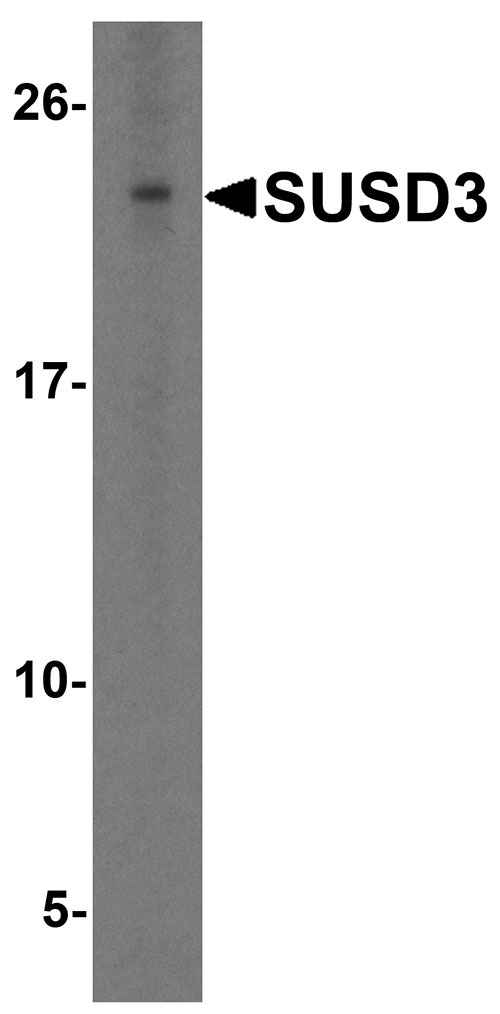SUSD3 Antibody
- 产品详情
- 实验流程
- 背景知识
Application
| WB, E |
|---|---|
| Primary Accession | Q96L08 |
| Other Accession | NP_659443, 21450717 |
| Reactivity | Human, Mouse |
| Host | Rabbit |
| Clonality | Polyclonal |
| Isotype | IgG |
| Calculated MW | 27119 Da |
| Concentration (mg/ml) | 1 mg/mL |
| Conjugate | Unconjugated |
| Application Notes | SUSD3 antibody can be used for the detection of SUSD3 by Western blot at 1 - 2 µg/mL. |
| Gene ID | 203328 |
|---|---|
| Other Names | Sushi domain-containing protein 3, SUSD3 |
| Target/Specificity | SUSD3; SUSD3 antibody is human and mouse reactive. Multiple isoforms of SUSD3 are known to exist. |
| Reconstitution & Storage | SUSD3 antibody can be stored at 4℃ for three months and -20℃, stable for up to one year. |
| Precautions | SUSD3 Antibody is for research use only and not for use in diagnostic or therapeutic procedures. |
| Name | SUSD3 |
|---|---|
| Function | May play a role in breast tumorigenesis by promoting estrogen-dependent cell proliferation, cell-cell interactions and migration. |
| Cellular Location | Cell membrane; Single-pass membrane protein. Note=Prominently localized to cell-cell borders. |
| Tissue Location | Highly expressed in estrogen receptor-positive breast tumors. |
For Research Use Only. Not For Use In Diagnostic Procedures.
Provided below are standard protocols that you may find useful for product applications.
BACKGROUND
Little is known of the function of the sushi domain containing 3 protein (SUSD3), but its expression has been reported in estrogen receptor-alpha (ERalpha)-positive breast tumors with decreased expression reported in aggressive malignant tumors (1,2). Recently, SUSD3 has been found to promote estrogen-dependent cell proliferation and may regulate cell-cell and cell-substrate interactions and migration in breast cancer (3). Furthermore, elevated SUSD3 mRNA levels were observed in aromatase inhibitor-responsive breast tumors, suggesting that it may also serve as a novel predictor of response to endocrine therapy and a potential therapeutic target (3).
REFERENCES
Abba MC, Hu Y, Sun H, et al. Gene expression signature of estrogen receptor alpha status in breast cancer. BMC Genomics 2005; 6:37.
Parris TZ, Danielsson A, Nemes S, et al. Clinical implications of gene dosage and gene expression patterns in diploid breast cancer. Clin. Cancer Res. 2010; 16:3860-74.
Moy I, Todorovic V, Dubash AD, et al. Estrogen-dependent sushi domain containing 3 regulates cytoskeleton organization and migration in breast cancer cells. Oncogene 2015; 34:323-33.
终于等到您。ABCEPTA(百远生物)抗体产品。
点击下方“我要评价 ”按钮提交您的反馈信息,您的反馈和评价是我们最宝贵的财富之一,
我们将在1-3个工作日内处理您的反馈信息。
如有疑问,联系:0512-88856768 tech-china@abcepta.com.























 癌症的基本特征包括细胞增殖、血管生成、迁移、凋亡逃避机制和细胞永生等。找到癌症发生过程中这些通路的关键标记物和对应的抗体用于检测至关重要。
癌症的基本特征包括细胞增殖、血管生成、迁移、凋亡逃避机制和细胞永生等。找到癌症发生过程中这些通路的关键标记物和对应的抗体用于检测至关重要。 为您推荐一个泛素化位点预测神器——泛素化分析工具,可以为您的蛋白的泛素化位点作出预测和评分。
为您推荐一个泛素化位点预测神器——泛素化分析工具,可以为您的蛋白的泛素化位点作出预测和评分。 细胞自噬受体图形绘图工具为你的蛋白的细胞受体结合位点作出预测和评分,识别结合到自噬通路中的蛋白是非常重要的,便于让我们理解自噬在正常生理、病理过程中的作用,如发育、细胞分化、神经退化性疾病、压力条件下、感染和癌症。
细胞自噬受体图形绘图工具为你的蛋白的细胞受体结合位点作出预测和评分,识别结合到自噬通路中的蛋白是非常重要的,便于让我们理解自噬在正常生理、病理过程中的作用,如发育、细胞分化、神经退化性疾病、压力条件下、感染和癌症。






